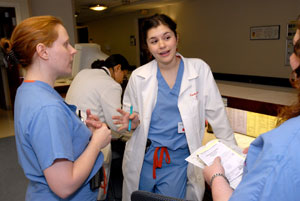November 6th, 2014 by Dr. Val Jones in Opinion, Research
No Comments »
 I have spent many blog hours bemoaning the inadequate communication going on in hospitals today. Thanks to authors of a new study published in the New England Journal of Medicine, I have more objective data for my ranting. A prospective intervention study conducted at 9 academic children’s hospitals (and involving 10,740 patients over 18 months) revealed that requiring resident physicians to adopt a formal “hand off” process at shift change resulted in a 30% reduction of medical errors.
I have spent many blog hours bemoaning the inadequate communication going on in hospitals today. Thanks to authors of a new study published in the New England Journal of Medicine, I have more objective data for my ranting. A prospective intervention study conducted at 9 academic children’s hospitals (and involving 10,740 patients over 18 months) revealed that requiring resident physicians to adopt a formal “hand off” process at shift change resulted in a 30% reduction of medical errors.
What was the intervention exactly? Details are available via mail order from the folks at Boston Children’s Hospital. It may take me a few weeks to get my hands on the curriculum (which was supported by a grant from the Department of Health and Human Services). I’m not sure how complex the new handoff initiative is in practice (or if it’s something that could be replicated without government-approved formality) but one thing is certain: disciplined physician communication saves lives.
I myself (without a grant from HHS or a NEJM study to back my assertions – ahem) proposed a set of comprehensive communication practices that can help to reduce medical errors in the hospital. My list involves more than peer hand-offs, but also nursing communication, EMR documentation strategies, and reliance on pharmacists for medication reconciliation and review. It is more than just an information exchange protocol for shift-changes, it is a lifestyle choice.
I applaud the I-PASS Handoff Study for its rigorous, evidence-based approach to implementing communication interventions among pediatric residents in children’s hospitals. I am stunned by how effective this one intervention has been – but a part of me is saddened that we practically had to mandate the obvious before it got done. What will it take for physicians to adopt safer communications strategies for inpatient care? I’m guessing that for many of us, it will involve enrollment in a workshop with hospital administration-driven requirements for participation.
For others of us – regular communication with staff, patients, and peers already defines our medical practice. But because (apparently?) we are not in the majority, we’ll just carry on our instinctual carefulness and wait for the rest to catch up. At least now we know that there is a path forward regarding improving communication skills and transfer of patient information. If we have to force doctors to look up from their iPhones and sit around a table and speak to one another – then so be it. The process may improve our lives while it saves those of our patients.
October 10th, 2013 by Dr. Val Jones in Announcements, Health Policy
2 Comments »
 I have been an outspoken, and often times exasperated, patient advocate and student of healthcare reform. There is no doubt that the U.S. healthcare system is operating far below its potential in terms of efficiency, effectiveness, and affordability. In fact, an entire industry of policy wonks and consultants have sprung up in both the public and private sectors – all with recommendations about how to “fix” our system. In my opinion, the most insightful suggestions will come from those who are currently doing the work of healthcare (i.e. clinicians) and change will be adopted and promoted most fervently by the young and freshly minted among them.
I have been an outspoken, and often times exasperated, patient advocate and student of healthcare reform. There is no doubt that the U.S. healthcare system is operating far below its potential in terms of efficiency, effectiveness, and affordability. In fact, an entire industry of policy wonks and consultants have sprung up in both the public and private sectors – all with recommendations about how to “fix” our system. In my opinion, the most insightful suggestions will come from those who are currently doing the work of healthcare (i.e. clinicians) and change will be adopted and promoted most fervently by the young and freshly minted among them.
Medical students, residents, and physicians newly in practice now have a place to voice their opinions – The American Resident Project is an ambitious movement to promote fresh thinking from tomorrow’s physician-leaders. I am pleased to be supporting this effort here on my blog and in face-to-face meetings with fellows at medical centers across the country. I hope you’ll bookmark the website and join in the community conversation about how to innovate in the midst of a broken system. This is more than a think-tank for change – the ideas and opinions of young doctors may be our best hope for a brighter tomorrow.
Stay tuned for some fresh ideas in the setting of some healthy talk therapy!
October 24th, 2011 by Michael Sevilla, M.D. in Opinion
No Comments »


Just wanted to get some initial thoughts down following the Family Medicine Summit organized by the California Academy of Family Physicians. I’ll have some more developed thoughts in a later post. These initial thoughts were from the plane going from that meeting to the Mayo Clinic Social Media Summit – the meeting I’m at right now.
First of all, thanks again to the California Academy of Family Physicians for the invitation to speak. The audience was mainly Family Medicine Residents and medical students. From my understanding, the registration numbers exceeded expectations (I take full credit for that – Hehe). It’s always energizing to me to present to residents & students.
The opening keynote was from CAFP President Dr. Carol Havens. She asked the audience for words that they think of when you hear “Family Physician.” And, as you can see from this twitpic, the audience came up with a huge list of Family Physician qualities. My favorites are “comprehensive care,” “revolution,” and, of course, “Love.”
My leadership & advocacy sessions Read more »
*This blog post was originally published at Family Medicine Rocks Blog*
October 16th, 2011 by RyanDuBosar in Research
No Comments »

Sometimes having no end of job prospects, more than one in four new doctors regret going into medicine by their graduation, according to a recruitment firm survey.
Recruiters Merritt, Hawkins asked new doctors if they would study medicine if they had it all to do over again, and 28% said they would select another field, up from 18% in a similar survey in 2008.
Still, the newly minted physicians have plenty to do while they mull other options. About 78% of newly minted physicians received at least 50 job solicitations during their training, and 47% received 100 or more contacts from recruiters.
Despite the heavy rotation of recruiters, residents Read more »
*This blog post was originally published at ACP Internist*
August 25th, 2011 by RamonaBatesMD in Research
No Comments »

I was alerted to this Archives of Surgery article (full reference below) by MedPage Today: Role Playing Boosts Surgical Residents’ Bedside Manner.
I find it intriguing. Role playing gives you a chance for a “do-over” when you make a social or communication faux pas.
So much of medicine is communication. Those of us who have been at it for years, deliver bad news differently (learned the hard way) now than we did previously. You choose your words more carefully (though I still occasionally screw up). Some words are more emotionally charged than others. Some patients want more information than others.
The University of Connecticut Health Center conducted a prospective study of a pilot project designed to teach surgical residents patient-centered communication skills.
The study offered Read more »
*This blog post was originally published at Suture for a Living*
 I have spent many blog hours bemoaning the inadequate communication going on in hospitals today. Thanks to authors of a new study published in the New England Journal of Medicine, I have more objective data for my ranting. A prospective intervention study conducted at 9 academic children’s hospitals (and involving 10,740 patients over 18 months) revealed that requiring resident physicians to adopt a formal “hand off” process at shift change resulted in a 30% reduction of medical errors.
I have spent many blog hours bemoaning the inadequate communication going on in hospitals today. Thanks to authors of a new study published in the New England Journal of Medicine, I have more objective data for my ranting. A prospective intervention study conducted at 9 academic children’s hospitals (and involving 10,740 patients over 18 months) revealed that requiring resident physicians to adopt a formal “hand off” process at shift change resulted in a 30% reduction of medical errors.

 I have been an outspoken, and often times exasperated, patient advocate and student of healthcare reform. There is no doubt that the U.S. healthcare system is operating far below its potential in terms of efficiency, effectiveness, and affordability. In fact, an entire industry of policy wonks and consultants have sprung up in both the public and private sectors – all with recommendations about how to “fix” our system. In my opinion, the most insightful suggestions will come from those who are currently doing the work of healthcare (i.e. clinicians) and change will be adopted and promoted most fervently by the young and freshly minted among them.
I have been an outspoken, and often times exasperated, patient advocate and student of healthcare reform. There is no doubt that the U.S. healthcare system is operating far below its potential in terms of efficiency, effectiveness, and affordability. In fact, an entire industry of policy wonks and consultants have sprung up in both the public and private sectors – all with recommendations about how to “fix” our system. In my opinion, the most insightful suggestions will come from those who are currently doing the work of healthcare (i.e. clinicians) and change will be adopted and promoted most fervently by the young and freshly minted among them.











